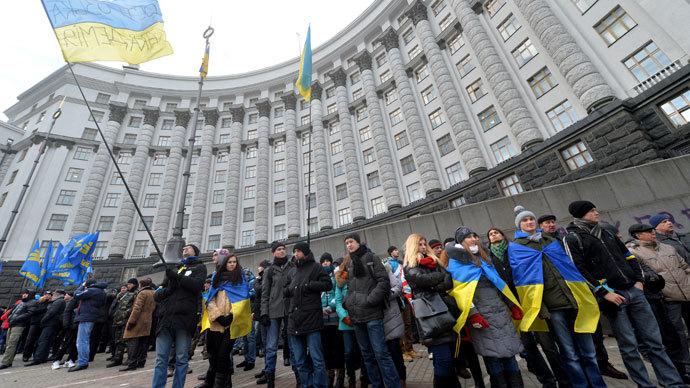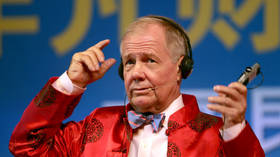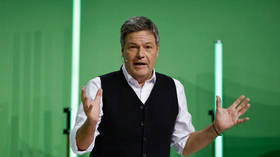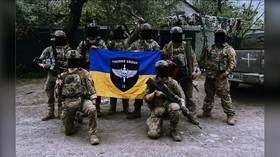'Sizeable proportion of Ukrainians would resist another Orange Revolution'

Yanukovich's position is nowhere near as shaken as that of the pre-Orange Revolution government was when it fell in 2004, foreign affairs author Srdja Trifkovic told RT.
With the protests in Kiev continuing, Ukrainian Prime Minister Nikolay Azarov has called on his opponents and thousands of street protesters to de-escalate the tension and negotiate. He said that the government "is ready for dialogue."
On Tuesday, the Ukrainian government survived a vote of no confidence initiated by opposition MPs in the Verkhovna Rada.
Meanwhile, President Yanukovich left Ukraine for planned trips to China and Russia, in search of a financial aid for Ukraine’s near bankrupt economy.
RT:Could current protests lead to regime change like it was during the Orange revolution?
Srdja Trifkovic: In my opinion the government in Kiev is much more stable today than the Kuchma’s establishment was in the fall of 2004. Even if we look at the maximum number that has reportedly turned up for protest in Kiev, in Lvov, in the west and elsewhere, we are talking about 1 percent of Ukraine’s population.
In 2004 the Kuchma establishment was so thoroughly discredited, in particular after the famous cassette affair of 2000, there was hardly anyone willing or ready to stand up in defense of the existing government. So effectively the Orange Revolution, lavishly funded from the West as it happened, didn’t have much resistance.
It wasn’t really facing an organized or self-confident government that could count on the sizeable percentage of the Ukrainian population to resist the Orange tidal wave. Today it’s no longer the case. Today I think that in spite of all problems that Yanukovich has had domestically of the past three-and-a-half years, his position is nowhere near as shaken as that of the pre-Orange government had been in the fall of 2004.
At the same time Thorbjørn Jagland, general-secretary of the Council of Europe, left for Ukraine to take part in meeting of the Ukrainian prime minister, foreign minister and parliamentary parties aimed at discussing the current situation and finding a solution.
RT:We are seeing organized groups of rioters that seem to provoke the police. Opposition and the government blame each other for this. Who do you think is really behind those groups?
ST: We need to ask the question who gains? And it’s obvious that the government has nothing to gain by escalating violence. The government is actually hoping that it will gradually die down. The only people who have a vested interest in provoking violence are the protesters themselves, or to put it more precisely, those who are behind the organized aspect of the protests, because it would work wonders both in the Western media and in the entire anti-Yanukovich segment of the Ukrainian population to have the martyrs of the so-called peaceful protest, who are being suddenly beaten savagely by the police.
No, that scenario simply doesn’t sound convincing. In my opinion, the violence that has been instigated is perhaps by the fringe elements of the protesters but certainly not by the government because they have nothing to gain.

RT:Yanukovich said there are plans for further discussion of the shelf deal with EU. Has he caved in to the protesters then?
ST: No, he has not caved because he’s been saying all along that the road to European integration is not over and negotiations will continue. He is simply unhappy with the fact that at this moment of the time the EU didn’t offer a sufficient economic and financial inducement for Ukraine to take this path because the cost of Ukraine adjusting itself to European rules and regulations would be enormous and the benefits would become visible only 10 years down the road. And God only knows if the EU will even exist in 10 years hence.
‘EU wanted to get Ukraine for nothing’
RT:Should Ukraine rethink its position and sign the EU deal? What’s the EU’s interest?
ST: The EU is only interested in the geopolitical aspect of drawing Ukraine away from Russia, and in this context with Poland and Germany finally finding the common front that we should look at the whole scenario. On the other hand, the EU wanted to get Ukraine for nothing. They were not prepared to open the purse, they were not even prepared to relend even on the unreasonable demand that Yulia Tymoshenko be not only set free, but allowed to go abroad for medical treatment.
For Ukraine to rethink and sign would be indeed - I wouldn't like to use a dramatic word like 'suicidal' - but it'll definitely be self-defeating. It would cost Ukraine tens of billion dollars or euro without any tangible benefits for many years to come. Ukraine in its fragile current economic position simply cannot afford to sign a deal of that kind.
RT:What if the rethinking happens as a result of the revolution? Will the EU still accept a partner after such unrest?
ST: First of all, I don’t think it’s a realistic scenario because if there is a pro-EU near-Orange Revolution, there would be a pro-Customs Union, pro-Russian counterrevolution. So it would be the path to a civil war. In the industrial basin of the east they know that if they join the EU package (of course they will never join the EU itself), they would lose customs privileges in Russia and their industrial goods which are still being exported to Russia in increasing quantities will suddenly become 35 percent more expensive, which would price them out of the market. At the same time I doubt very much that the EU countries would suddenly express an interest in buying Ukrainian industrial goods.
So the premise of the question is false, there will be no revolution. Even if there is an attempt at the violent overthrow of the government, there would be definitely a very sizeable counterforce ready to come on the streets. It is no longer 2004 when no one was willing to risk their skin for Kuchma.

RT:Yanukovich has been accusing Russia and the EU in terms of putting pressure on Ukraine. Is he just trying to play both sides?
ST: It is not to say that there have not been various forms of pressure from both sides. It is indeed remarkable that after the cooling of relations between Yanukovich and Putin in recent years, he has suddenly realized that key national interests have to come before personal likes and dislikes. There will be more pressure from both sides in various forms, but it is simply politics as usual.
There is no free lunch and both Brussels and Moscow will offer their terms, and it is up to Ukraine to decide which set of terms is more favorable. I think to a reasonable person it’s pretty obvious that the Customs Union and Russian market are the ones who offer more tangible and more viable sets of benefits for Ukraine, which needs economic relief very badly indeed.
RT:Can Ukraine actually benefit from both the partnerships with EU and Russia?
ST: Ukraine could benefit from the best of both worlds if it was on offer, but it is not. You simply cannot have your cake and have it at the same time. Joining the euro-enthusiasts would simply mean that you can no longer enjoy certain benefits that otherwise are on offer. Joining the Customs Union and strengthening relations with Russia means that Brussels will be no longer waving an attractive carrot, not that the carrot they offer at the moment is particularly attractive, it’s a very thin and veiny carrot indeed.
The statements, views and opinions expressed in this column are solely those of the author and do not necessarily represent those of RT.
The statements, views and opinions expressed in this column are solely those of the author and do not necessarily represent those of RT.












